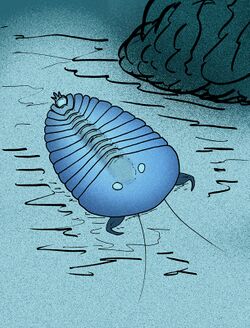Biology:Latromirus
| Latromirus | |
|---|---|

| |
| Restoration | |
| Scientific classification | |
| Domain: | Eukaryota |
| Kingdom: | Animalia |
| Phylum: | Arthropoda |
| (unranked): | †Vicissicaudata |
| (unranked): | †Cheloniellida |
| Genus: | †Latromirus not yet validly published |
| Species: | †L. tridens
|
| Binomial name | |
| †Latromirus tridens not yet validly published; see preprint by Wendruff et al., 2018[1]
| |
Latromirus tridens is an extinct cheloniellid arthropod from the Silurian period of Wisconsin. While Latromirus closely resembles other cheloniellids, such as Triopus or Duslia, Latromirus can be easily distinguished from its relatives by the presence of a pair of raptorial limbs that extend from underneath the head region, or cephalon.
The name has not so far been published in a way recognized by the ICZN. It occurs only in a PhD thesis,[2] which does not count as published (ICZN Article 9.12); the description of the genus & species has been published only as a preprint,[1] which likewise does not count as published under Article 9.9.
Etymology
The intended genus name is derived from "latro", meaning "robber" in Latin (given as "hunter" in the preprint, which would be "venator"), and "mirus", meaning "extraordinary", thus referring to the animal's large raptorial appendages that were most probably used for seizing prey.[1] The intended species name, "tridens", is a kind of three-pronged spear, in reference to the triple-pointed postabdomen.[1]
Geological setting
The fossils of "Latromirus" are found in the Telychian-aged Brandon Bridge Formation in southeastern Wisconsin, near Waukesha. The nature of the local sedimentation suggests that the area was an offshore, shallow-water environment, and that the fossils found in this site were brought there from nearby areas via water currents. The various carcasses were then left undisturbed long enough for algae and sediments to cover them before they decayed or were disturbed by scavengers or burrowing organisms.
References
- ↑ 1.0 1.1 1.2 1.3 Wendruff, Andrew J., Babcock, Loren E., Mikulic, Donald G., Kluessendorf, Joanne (2018) New cheloniellid arthropod with large raptorial appendages from the Silurian of Wisconsin, USA. BioRxiv 407379. [1]
- ↑ Wendruff, Andrew James (2016) Paleobiology and taphonomy of exceptionally preserved organisms from the Brandon Bridge Formation (Silurian), Wisconsin, USA (Doctoral dissertation, Ohio State University). OhioLINK. [2]
Wikidata ☰ Q65060187 entry

